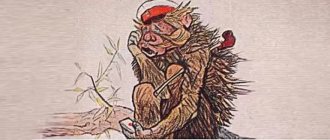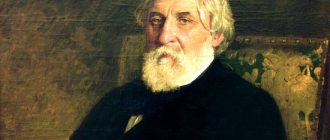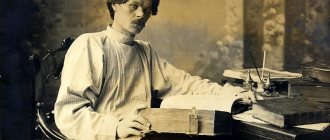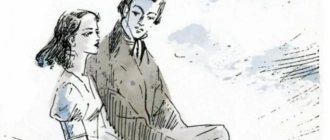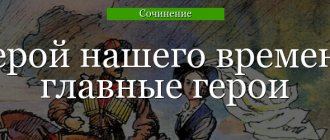Hidden love plot. The role of literary reminiscences.
The most dramatic plot twist is that Volodya’s father appears on the stage and becomes his rival. Love, which obviously cannot be happy, flared up in the hearts of two people. For the time being, we can guess about this secret passion only on the basis of literary reminiscences. This is enough for the attentive reader. We see how painful it is for a girl to admit her capitulation in the face of awakened feelings. Zinaida accompanies the reading “On the Hills of Georgia…” with the words “that it (the heart) cannot help but love - and it would like to, but it cannot!” Listening to the crackling phrases of Maidanov’s poem, the heroine could not hide her excitement. "My God! She fell in love!” - Volodya suspects for the first time.
Zinaida, who is in love, turns out to be a talented poetess, the author of unique live improvisations. On the threshold of her love, she proposes a plot for a poem from the times of Ancient Greece and Rome. The princess gives her feelings an ancient obsession: “The bacchantes call the girls in the boat to them... And suddenly one of them quietly rises... She stepped over the edge of the boat, the bacchantes surrounded her, sped off into the night, into the darkness...”
Another time, the heroine imagines “the purple sails that Cleopatra had on the golden ship when she rode to meet Antony.” This sparks an interesting conversation. “How old was Anthony then?” — the girl suddenly becomes interested. Maidanov’s philistine reasoning—“He was probably a young man…”—is interrupted by the doctor’s historical certificate: “He was over forty years old.” “For forty years,” Zinaida repeated, glancing at him quickly.
The next improvisation takes us to knightly times. Zinaida imagines herself as a young queen. “And there, near the fountain <...> the one I love, who owns me, stands and waits for me. Nobody knows him, but he is waiting for me and is sure that I will come - and I will come, and there is no power that would stop me...” The listeners interrupt the story several times, trying to understand the hidden meaning. Those who are most loving and therefore insightful approach the truth: “You yourself are this queen!”
Defeat in the fight against feelings turns into the girl’s first moral victory. Zinaida finally showed the scoundrel Malevsky the door. The clever count persuades the naive Volodya to follow Zinaida. The young man agrees, imagining himself as a romantic avenger, the hero of the poems he read: “I kept imagining: Aleko, a young gypsy.” In Volodya's moods, the seriousness of feelings is adjacent to the funny naivety of a child. The landscape reflects the same mood. In the description of the romantic night (“The night was dark, the trees were barely whispering; a quiet chill was falling from the sky...”), the narrator adds a prosaic detail: “The smell of dill was coming from the garden.” On the first night the expectations were unsuccessful. Volodya thought he saw “a female figure flash by.” “Can I hear steps...? Is it suppressed laughter?.. or rustling in the leaves?” A minute later, “a window clanged somewhere.” “I felt scared,” Volodya notes. Not like a child in the dark, but like an adult who sacrilegiously violated someone else's privacy. He frightened away happiness, which nature itself reverently guards: “And suddenly everything around became deeply silent... Even the grasshoppers stopped chattering in the trees.” Returning home, Volodya clearly realized that he had “passed by someone else’s happiness.” The next night Volodya “took out a recently purchased English knife from his desk.” It is unknown how it would have ended if... he had not examined the figure wrapped in a cloak. “A man appeared... my God! it was my father!
This discovery forces the reader to rethink the previous episodes, as if replaying a film. We understand Zinaida’s previously inexplicable words and actions towards Volodya. For example, an outburst of unmotivated cruelty when she, “... grabbed me by the hair and began to twist it.
It hurts... - I finally said.
A! hurt! doesn't it hurt me? doesn't it hurt?
This is immediately followed by Zinaida’s passionate repentance. “I’ll put your hair in my locket and wear it,” she said, and tears were shining in her eyes.” The writer explores the psychological phenomenon: a girl in love identifies a young man with his father. Volodya can by no means be called an outside observer. In his own way, and without knowing it, he determined a lot in the relationship between his father and Zinaida.
In the seventh chapter, he spoke about his “strange relationship” with his father. The memory portrays him as an intelligent, charming, but cold and selfish person. Volodya is passionately attached to him: “I loved him, he seemed to me the ideal of a man. It used to be that I would begin to look at his smart, handsome, bright face <...>, my heart would tremble, and my whole being would rush to him...” The narrator admits that Pyotr Vasilyevich “respected his son’s freedom” and “never insulted” him. But for Volodya this indifference in response to “silent but understandable pleas” was a hundred times worse than any physical insult. “Attacks” of a father’s desire to talk “about anything,” “to fool around with his son” were “rare” and stemmed from his own capricious impulse. In Volodya’s memory, like a jewel, the memory of how his father “just once” is preserved! caressed him. Usually the father avoided showing feelings, the boy “shrank and also grew cold.”
Pyotr Vasilyevich took the affection of his loved ones for granted and was of little interest to him. An Epicurean, he lived for his own pleasure - “he thoroughly enjoyed this other thing,” “most of all he wanted to live - and he lived.” In a moment of frankness, he revealed to his son his life rules: “Take what you can, but don’t let it get into your hands.” The nature of the proud Pyotr Vasilyevich is revealed even more by the reasoning about how much higher than freedom is will. “Your own will, and it will give you power, which is better than freedom, you will command.” These proud words remind us most of all... Zinaida. In both cases, we become witnesses to how passions, against the will, overwhelm a selfish, proud person.
The author allows us to judge the father’s feelings and intentions not directly, but through the eyes of the simple-minded Volodya. Unlike the naive young man, the reader begins to guess about the mutual attraction of Pyotr Vasilich and Zinaida before. Perhaps it all started on the day when he, having asked the naive Volodya for details of a visit to an interesting house, decided to pay a visit. Or maybe mutual interest arose earlier - on the day the Zasekin mother and daughter visited Volodya’s family? Pyotr Vasilyevich decided, shaking his old ways, to court an interesting neighbor, hoping that the narrow-minded mother would not guess or object. Most likely, he, like Doctor Lushin, considered himself invulnerable to love. And he had no idea that their meetings would be long and painful for him. Their first ride on horseback is reminiscent of Pechorin’s courtship of Princess Mary: “The father said something to her, bending over to her with his whole figure and resting his hand on the horse’s neck; he smiled. Zinaida listened to him in silence, sternly lowering her eyes and pursing her lips.” “He is as red as a lobster,” I thought, “and she... Why is she so pale?
Zinaida's sincere selfless love for Pyotr Vasilich amazed everyone who knew this proud girl. “One thought never left my head: how could she, a young girl - well, a princess after all - decide to do such an act, knowing that my father was not a free man? How were you not afraid to ruin your entire future?” - thinks the shocked Volodya. His thoughts merge with the exclamations of the disgraced skeptic Lushin: “And I, a fool, thought that she was a coquette! Apparently, sacrificing oneself is sweet for others.”
The narrator briefly talks about the scandals between the parents, which led to the family moving first to a Moscow house and then to St. Petersburg. The key role in these sad events was played by the same Count Malevsky, who, in a fit of jealous rage, sent an anonymous letter to Volodya’s mother. A parallel scene plays out: Volodya’s father also expels the count from his house. At the same time, he emphasizes that he is doing this in the footsteps of Zinaida: “A few days ago, your Excellency was shown the door in one house. I’ll throw you out the window.”
Apparently, money matters were also involved. The clever princess, obviously, managed to turn her daughter’s love to her advantage and took some kind of promissory note from Volodya’s father. Tyutchev's lines come to mind. Shuddering from the pressure of human vulgarity, the poet exclaimed: “Oh, if only the living wings / of the Soul Soaring above the crowd / would save her from the violence / of immortal human vulgarity!” Those who had the right to be indignant behave extremely nobly. The justly offended mother, observing decency, even ordered “to bow to the princess and express regret to her that, due to ill health, she would not see her before leaving.” Volodya, despite the fact that he experienced a real shock, “didn’t even complain” about his father. “What I learned was beyond my power: this sudden revelation crushed me.”
On the eve of departure, Volodya goes to the neighbor's outbuilding for a last conversation. When they meet, the young man utters words worthy of a true devoted knight: “Believe me, Zinaida Alexandrovna, no matter what you do, no matter how much you torment me, I will love and adore you until the end of my days.” Zinaida appreciated this generous impulse: “She kissed me deeply and passionately.” But this caress also had another meaning. Comforting the princess, Volodya also acts as if on behalf of his father, who, due to the conditions of decency, could not say goodbye to her. “God knows who this long, farewell kiss was looking for,” the narrator will note, Volodya or Pyotr Vasilyevich?
On behalf of his hero, the writer expresses a sincere thought. There are moments of life that are worth many years, for which they pay with exorbitant tension of mental strength. And yet a person can consider himself a beggar without experiencing them. “I knew that it would never happen again,” concludes the aged Vladimir Petrovich about this kiss and about all his love. “I wouldn’t want it to ever happen again; but I would consider myself unlucky if I never experienced it.” Volodya sincerely believes that this meeting with Zinaida was his last. He was able to nobly forgive his beloved. He did not stop respecting his father: “I did not have any bad feelings against my father. It’s as if he has still grown in my eyes...” The narrator calls such nobility a “psychological contradiction.” But, despite this, Volodya for a long time is not able to overcome the pain, shake off the spell of fading love. “It was all over,” he sums up his perception of the world. “All my flowers were torn out at once and lay around me, scattered and trampled.”
Year:
1860
Genre:
story
Main characters:
Volodya, Princess Zinaida
Princess Zasekina moves into the outbuilding next to the family of sixteen-year-old Vladimir. Volodya falls in love with the princess's daughter, Zinaida. One day he meets his beloved with his own father. Having followed them, Vladimir realizes that Zina is not indifferent to his father. After the scandal with Zasekina, the neighbors return to Moscow. Some time later, the young man entered the university, and six months later his father died of shock. Four years later, Vova returns to St. Petersburg and visits Zinaida Zasekina, where he learns that she died 4 days ago during the birth of her child.
the main idea
. The story tells about unrequited first love, about how tragic relationships in a family can be if they are not based in any way on love.
Retelling
Sixteen-year-old Vova lives with his father and mother at the dacha and is preparing to enter university. Princess Zasekina moves into the neighboring outbuilding for a period of rest. The main character accidentally meets his neighbor's daughter and dreams of meeting her. Volodya's mother sends him to a neighbor with an offer to pay a visit. This is how the young man first meets his neighbor’s daughter, Zinaida Zasekina, who is a little older than him, she is 21 years old.
During the visit, Zasekina creates a not very good image of herself, but Zinaida behaves impeccably, but spends almost the entire evening talking only to Vladimir’s father. She showed no interest in the young man during the conversation, but before leaving he asks to pay her a visit. The young man increasingly comes to Zinaida in the evenings, and eventually realizes that he is in love with her. One night, Vladimir becomes an unwitting witness to his beloved’s meeting with his father. Volodya realizes that she is not indifferent to his father. The young man does not stop communicating with the princess’s daughter, pretending that nothing is happening. A week later, his mother was sent a letter accusing her husband of having an affair with a neighbor’s daughter. After a scandal in the house, the Zasekins leave for Moscow. Before leaving, the young man in love decides to say goodbye to Zina and promises to love her forever.
A few days later, Volodya again involuntarily watches the scene of the meeting of his beloved girl and his father, he tries to convince her of something, she does not give consent and extends her hand to him. The father swings and hits her hand with the whip, she shudders and raises her hand to her mouth, touching the red mark of the blow with her lips. Vladimir runs away.
After some time, the young man’s family moved to St. Petersburg. Vova goes to college, but six months later his dad died of shock. After graduating from university, Volodya finds Zina’s friend in the theater to pay a visit to his beloved only a couple of weeks later. Arriving at the address, he learns that Zinaida Dolskaya died four days ago during the birth of her child.
Other characters
- Princess Zasekina is Zinaida's mother, an unkempt, uneducated woman with bad manners.
- Vladimir's mother is a reserved, delicate woman who was much older than her husband.
- Malevsky, Lushin, Maidanov, Nirmatsky and Belovzorov are fans of Zinaida.
And we also have:
for the busiest -
Reader's diary “First Love”
for the coolest -
Read “First Love” in full
Detailed summary of the work First Love
The story “First Love” is one of the most popular and famous. This is a story about the first love of a young man who has just emerged from childhood and is striving for new feelings and sensations. The basis of the plot is the memory of an already adult man about his first experience of communicating with a girl, about youth, and the desire for the unknown.
The main thread of the story is the idea that first love is the awakening of all the best in a person. First love is like the first thunderstorm or a fast flow of water, something spontaneous and not subject to reason.
A young man named Vladimir, who had just completed a home-schooling course, arrived at a country house with his parents. Here he must prepare to enter university and take a break from the bustle of the city. And, as it turned out, another family, consisting of two ladies, settled next door. One was quite young and very beautiful, of course, in the young man’s opinion.
Summer, languid evenings, black nights and early dawns did their job; they awakened unknown feelings in the young man. Vladimir fell in love with Zinaida, that was the name of the young neighbor, who also turned out to be sociable.
The girl was young, although older than Volodya, smart, open to communication, sometimes flighty, sometimes mysterious. no longer allowed the young man to come for visits. And, as a result, the young man became more and more immersed in love. Naturally, all other matters were abandoned, as well as preparation for studies. I felt the need to take long walks through the garden and find a reason to see my beautiful neighbor.
However, although Zina was constantly surrounded by fans, not one of them crossed the line to become closer to the girl. Although Volodya really wanted to see the whole situation. In fact, Zina was in love with the young man’s father, and she also experienced her love, but it was forbidden and not right. The girl secretly, at night, met with an adult man and at the same time suffered no less than her young neighbor. Zina's relationship with Volodya's father continued for quite a long time, even after the family returned to Moscow.
Only once seeing his father with Zina, Volodya realized that the girl was truly in love. And this became a loss for the young man; he learned and defined for himself what unrequited love is.
The story ends tragically. Although Volodya becomes a student and grows up, his father dies an absurd death and this is a huge grief for the family. And one day the young man has the opportunity to see Zinaida, but even here evil fate prevents him. Zinaida dies two days before the meeting.
More than a century has passed since the publication of the story “First Love,” but the description of the feelings of young people, the description of youth, the effervescence of life has not lost any of its authenticity.
Tragic events
A few days later, the main character unexpectedly learns about his lover’s relationship with his father. The guy's mom leaves the man and moves to another city. Vladimir also wants to leave, goes to the girl and confesses his eternal love. Then he moves to St. Petersburg, where he enters the university. He lives happily for some time until his dad dies.
Then the guy accidentally meets an old friend on a busy street and learns that his beloved now lives in St. Petersburg and recently got married. He decides to visit her, but Vladimir has free time only after a few weeks. He doesn't have time to see her because she dies during childbirth.
You can make a plot retelling plan like this:
- meeting a young lady;
- the emergence of love feelings;
- romance between Zinaida and the protagonist's father;
- moving to St. Petersburg;
- the death of Vladimir's beloved.
In his story, the writer was able to describe all the versatility of love. It can be not only enthusiastic, but also very painful.
The author also discusses the topics of loneliness, family relationships and one’s own responsibility to relatives. After reading the retelling of the work, it is worth reading the book in its entirety.
Other retellings and reviews for the reader's diary
- Summary Jean-Christophe Rolland
In a small German town, a baby is born into the Kraft family, passionate about music, and they named him Christophe. From an early age, the child had an innate talent for music. Christophe composed his own melodies - Brief summary Prishvin's birch bark tube
If people cut out a small piece of bark on a birch tree, then the nearby part begins to curl into a microtubule. As it dries, it curls up even more tightly. - Summary of Astafyev Starfall
In this work, little attention is paid to descriptions of military actions and events, which are very characteristic of the author. This is a novel about the love story of a simple soldier named Mikhail and nurse Lida. - Summary of the Tin Drum Grass
In a psychiatric hospital in Danzig, the mentally ill Oskar Matzerath, a man who has never been separated from his only friend - a tin drum, is kept. He trusts him with his thoughts and secrets. - Summary Postscript by Shukshin
The book was written in 1972. The story is written in the form of a letter. This form of story was very common in the world of Russian literature. After reading the book, many readers get the feeling that the author reprinted someone else's letter.
I.S. Turgenev had a huge influence not only on literature, but also on the perception of the world among his readers; it is not for nothing that the term “Turgenev girl” became firmly established in the speech of educated people and became a common name for the canonical female image in national culture. This author has created many diverse works, but they are united by deep poetry in every word. His “First Love” is also imbued with it.
In 1844 I.S. Turgenev met the French singer Pauline Viardot and fell in love. As it turned out, forever. They quarreled, made up, the writer followed his beloved everywhere. But this love was doomed, and at the same time selfless. It was this feeling that gave rise to a number of lyrical and philosophical stories with a tragic love plot, including “First Love,” published in 1860. In these works, feeling is a disease that affects a person and deprives him of his will and reason.
The book was written in January-March 1860. The plot collision was based on the real story of the writer's family: a love triangle between the young writer, his father and Princess Ekaterina Shakhovskaya. The author noted that he had nothing to hide, and as for the condemnation of Turgenev’s frankness by his acquaintances, he did not care.
About the product
The story “First Love” by Turgenev was written in 1860 and in many ways became a reflection of the author’s personal experiences. This is a story about the first, half-childhood love, which had to face adult love, full of drama and sacrifice.
On our website you can read online a summary of “First Love” chapter by chapter, and then take a test to test your knowledge. A brief retelling of the work will be useful for the reading diary and preparation for a literature lesson.
The material was prepared jointly with a teacher of the highest category, Kuchmina Nadezhda Vladimirovna.
Experience as a teacher of Russian language and literature - 27 years.
Genre: short story or story?
A story is a short prose work that has a single plot line, one conflict and reflects a separate episode in the lives of the characters. A story is an epic genre, standing in volume between a novel and a short story, has a more complex and branched plot, and the conflict is a chain of episodes.
“First Love” can be called a story, since there are several main characters (usually one or two in a story). The work does not depict a single episode, but a chain of events connected by the development of a love conflict. Another genre feature of the story is that it is a story within a story. The narrator, who is also the main character, recalls episodes of his youth, so the introduction talks about the situation that led the narrator to memories: he and his friends were talking about the topic of first love, and his story turned out to be the most entertaining.
What is the work about?
In the company of friends, the narrator recalls his youth, his first love. As a 16-year-old boy, Vladimir was fascinated by his dacha neighbor, 21-year-old Zinaida. The girl enjoyed the attention of young people, but did not take anyone seriously, but spent evenings with them in fun and games. The heroine laughed at all her admirers, including Vladimir, and did not take life seriously at all. But once…
The main character noticed a change in his beloved, and soon it dawned on him: she fell in love! But who is he, the opponent? The truth turned out to be terrible, this is the father of the main character, Pyotr Vasilyevich, who married his mother for convenience, treats both her and his son with disdain. Pyotr Vasilyevich is not interested in the scandal, so love ends quickly. Soon he dies of a stroke, Zinaida gets married and also dies in childbirth.
The main characters and their characteristics
The description of the characters in the story “First Love” is dramatic and in itself gives rise to a conflict of interest. In a family where there is no harmony, love was perceived by men as a means to forget themselves or to feel needed. However, in pursuit of personal happiness, they did not delve into the hidden depths of Zinaida’s personality, and did not discern her essence. She poured out all the heat of her heart into an ice vessel and destroyed herself. Thus, the main characters of the work became victims of their own blindness, inspired by passion.
- Vladimir
is a 16-year-old nobleman, still under family care, but striving for independence and adulthood. He is overwhelmed by dreams of love, happiness, harmony, he idealizes all feelings, especially love. However, for the main character himself, love became a tragedy. Vladimir forgot about everything, was ready to constantly be at Zinaida’s feet, was absorbed only in her. And after the dramatic denouement, he mentally aged, all his dreams of a brilliant future were shattered, and only the ghost of unfulfilled love remained. - Zinaida
is a 21-year-old impoverished princess. She was in a hurry and longed to live, as if sensing that there would not be much time left. The main character of the story “First Love” could not calm down all her inner passion; despite the large selection of men, there was no loved one around. And she chose the most unsuitable one, for the sake of whom she disdained all prohibitions and decency, and for him she was just another entertainment. She got married in a hurry to hide the shame, died giving birth to a child from an unloved... So a life ended, full of only one, also unfulfilled love. - Pyotr Vasilyevich
is the father of the main character. He married a woman who was 10 years older for money, ruled and pushed her around. He showered his son with cold contempt. The family was completely unnecessary in his life; it still did not give him satisfaction. But the young neighbor, having loved him with all her heart, briefly gave him a taste for life. However, he could not leave his wife, it would be unprofitable, and there would be a scandal too. That's why the hero simply abandoned his mistress to the mercy of fate.
"First Love" (main characters)
The story was written by Turgenev as an autobiographical plot. Zinaida was in his destiny. It was his father who became interested in the young lady. Therefore, Turgenev was able to publish his work only after the death of his mother in 1860. Criticism did not accept Turgenev's Zinochka unfriendly. DI. Pisarev wrote that he did not understand her character, but for Dobrolyubov she was Pechorin and Nozdryov rolled into one. “No one has ever met such a woman, or would like to meet one,” the critic concluded.
The main characters of Turgenev’s story “First Love”:
Vladimir Petrovich is a bachelor. The main development of the plot occurs when Vladimir Petrovich was 16 years old. Then he first fell in love with his neighbor, Princess Zina Zasekina. He felt bliss when he was next to her, was insanely jealous of other men, and was sad when she was not around. Young Vladimir abandoned his classes, walks around the neighborhood, and stopped horseback riding.
Marya Nikolaevna, mother , did not pay any attention to her son, despite the fact that he was the only son. She was jealous, constantly worried or angry.
Pyotr Vasilyevich, the father , is an exquisitely calm, self-confident and autocratic man. He treated his son with indifference and kindness. He was 10 years younger than his wife and married her for convenience. He treated his son distantly and was almost not involved in his upbringing.
Princess Zasekina is a 50-year-old woman. Judging by her manners, she was not born into a princely family. In the second half of the 19th century, marriages between wealthy merchants and industrialists and impoverished nobles were accepted. The noble class degraded. Princess Zasekina was not distinguished by secular manners, and was even an unpleasant woman
Zinochka, Zasekina’s daughter , is a 21-year-old young lady. Flirty. Her face was subtle, smart and sweet. Unlike mother, she was distinguished by her secular manners and tact. She was not without princely arrogance. She spoke French perfectly and read. Zinochka liked men, and she knew it very well, and took advantage of it. She quickly noticed that 16-year-old Vladimir was in love with her, flirted with him, teased him, spoiled him, and made fun of him.
“In her entire being, tenacious and beautiful, there was some particularly charming mixture of cunning and carelessness, artificiality and simplicity, silence and playfulness; over everything she did and said, over her every movement there was a subtle, light charm, a peculiar, playful force was felt in everything. And her face was constantly changing, playing too: it expressed, almost at the same time, mockery, thoughtfulness and passion. The most varied feelings, light and quick, like the shadows of clouds on a sunny, windy day, ran over her eyes and lips every now and then.”
Zinaida was dominated by an incorrect upbringing, she was surrounded by strange people; poverty and disorder in the house. She felt superior to people and enjoyed boundless freedom. All this, taken together, developed in her a certain carelessness towards everything and undemandingness. “Caprice and independence,” is how Lushin described Zinochka.
Zinochka made fun of the poet Maidanov, sympathized with him, and at the same time forced him to read Pushkin.
But of all the men surrounding Zinochka, she fell in love with Pyotr Vasilyevich, Volodya’s father. She fell in love so much that she was able to take a blow from him with a whip. This struck young Vladimir most of all.
Count Malevsky spoke with a slight Polish accent. He was a handsome and smartly dressed brunette with a mustache, expressive brown eyes, a thin nose and a small mouth. He was smart and handsome, but there was a falseness, something dubious about him. He earned himself a reputation as a hoaxer; he masterfully fooled people at masquerades. He had the cunning of a fox and an unconscious deceit that was absorbed into his entire existence.
Dr. Lushin was distinguished by his truthfulness and straightforwardness. Vladimir Petrovich respected him for this trait. He knew Zinaida better than others, and probably loved her more than others. In words he was a cynical and mocking person.
The poet Maidanov is a tall young man with a thin face, dim eyes and long black hair. A cold man, like all writers, who lived in his own imaginary world. He assured Zinochka, and perhaps to a greater extent himself, that he adored her, sang her praises in his poems.
Retired captain Nirmatsky, a forty-year-old man, outrageously pockmarked, curly-haired like a blackamoor, stooped, bow-legged.
Belovzorov, hussar, was a handsome hussar with bulging eyes and blond curls and had a stately and even heroic build. As a military man, he always wore a uniform. He asked Zinaida to marry him. Zinochka called the hussar “my beast.” Belovzorov was incredibly jealous of Zinochka for everyone
The novel ends with the fact that 4 years after the events described, Zinochka dies during childbirth. Vladimir graduated from the University, and Zinochka married a certain wealthy Mr. Dolsky.
Subject
- The main theme of the story is love
. It's different here. And the self-humiliating feeling of Vladimir’s mother towards her husband: the woman is ready to do anything just not to lose her husband, she is afraid of him, afraid to admit to herself that he does not love her. And Vladimir’s hopeless, sacrificial love: he agrees to any role in order to be close to Zinaida, even a page, even a jester. And Zinaida herself has a passionate obsession: for the sake of Pyotr Vasilyevich, she becomes the same slave as his son before her. And love by chance for the protagonist’s father: women liked him, the neighbor was a new hobby, an easy affair. - The result of love is the next theme - loneliness
. And Vladimir, and Zinaida, and Pyotr Vasilyevich are broken by this love triangle. After the tragic ending, no one remained the same, they all found themselves alone forever, they died morally, and then the failed lovers died physically. - Family theme
. Of particular importance in the work is the unfavorable climate in the home of the protagonist. It was he who made him beg for love. The complexes received from the cold rejection of his father were expressed in his attitude towards Zinaida. This slavish worship destroyed his chances of success.
Issues
Moral problems are revealed in the work in several aspects. Firstly, does Zinaida’s life, the crowd of fans around her, with whom she plays like pawns, deserve understanding? Secondly, can forbidden love, which violates all moral standards, be happy? The plot development of events answers these questions negatively: the main character is punished for her disdain for her admirers by the disregard of her loved one, and their relationship inevitably leads to a break. And indirectly led to the death of both. However, the reader sympathizes with Zinaida, she is full of thirst for life, and this evokes involuntary sympathy. In addition, she is capable of deep feelings that evoke respect.
The problem of power in love is most fully expressed in the relationship between Zinaida and Pyotr Vasilyevich. The girl dominated her past gentlemen and felt very cheerful. But true love came, and with it suffering. And even suffering from a loved one is sweet. And no power is needed. Pyotr Vasilyevich hit her with a whip, and she gently brought the reddened place to her lips, because this is a mark from him.
The main characters of the story. Volodya and Zinaida
Analysis of the story by I.S. Turgenev "First Love"
Meet the hero and heroine. The narrative, in addition to the prologue, includes twenty-two small chapters. Their content does not exceed two or three pages - events and impressions change so quickly, the main character, Volodya, grows so quickly. He only recently broke up with his tutor, who, with his “care” for his pupil, resembles Monsieur Beaupré (“The Captain’s Daughter”). He, like Petrusha Grinev, turned sixteen years old. In those days, this age was considered the time to choose a life path. True, Volodya was not sent to serve in a distant fortress. The hero of “First Love” is peacefully preparing to enter university. He spends the summer at the dacha with his family. A rich family, outwardly decent, but internally flawed. The young man senses this unhappiness. He knows that between his mother and father there was a loveless marriage, common among the nobility. “My father,” Volodya says about his mother’s life drama, “is still a young and very handsome man, he married her for convenience; she was ten years older than him<…>. She was very afraid of him, but he behaved strictly, coldly, distantly...” But for the time being, the relationship between the parents does not occupy much of the hero’s mind. The “wonderful” weather is in harmony with Volodya’s mood, which was possessed, “like spring grass, by the joyful feeling of a young, simmering life.” As always with Turgenev, the mood is revealed through the landscape: “I had a riding horse, I saddled it myself and rode away <...>, started galloping and imagined myself as a knight in a tournament - how joyfully the wind blew in my ears! - or, turning his face to him, received his shining light and azure into his open soul.”
Volodya's soul is wide open to new impressions. The mood is prepared, and the reader is not surprised when Volodya falls in love with a young neighbor, Princess Zasekina, who has occupied the nearest house with her mother. “The dacha,” explains the narrator, “consisted of a manor house <...> and two low outbuildings.” But the story about meeting a girl is ahead. First, the author considered it necessary to tell who lives in the second outbuilding, which was turned into a factory. He shows how city workers work, boys just like the main character himself: “A dozen thin and disheveled boys in greasy dressing gowns with worn-out faces <...> jumped onto wooden levers <...> and thus, with the weight of their frail bodies, squeezed out the colorful wallpaper patterns." They have no time for the pleasures of life. A persistent reflection on the fatal guilt of the educated classes before the people is inherent in Turgenev. Wealthy people enjoy the benefits of life and do not notice their well-being. In "Rudin" Turgenev took us to a peasant hut. In “First Love” - to the factory.
Only after this does he draw a portrait of the main character. Zinaida appears as a vision, all the more beautiful because before this the young hero indulged in a not very poetic hobby. He went out to shoot crows, and suddenly “he saw a girl in a pink dress and headscarf behind the fence.” Volodya observed her from the side and therefore the heroine appears to us for the first time as a sketch in profile: “... A slender figure, and slightly disheveled blond hair under a white scarf, and this half-closed smart eye, and these eyelashes, and a tender cheek under them.” Volodya found more than one neighbor, and also engaged in a strange activity: “Four young men crowded around her, and she took turns slapping them on the forehead <…> with gray flowers.” A game that portrays childhood in the form of a heroine. And at the same time, one of the main features is revealed: youthful coquetry, the desire to captivate and conquer - “young people so willingly offered their foreheads - and in the girl’s movements <...> there was something so charming, commanding, mocking and sweet.” Volodya will instantly fall into the circle of young men, fascinated by her beauty.
Of course, the twenty-year-old girl looked down on the sixteen-year-old admirer. In a moment of affectionate frankness, Zinaida says: “Listen, I […] could be your aunt, really; Well, not an aunt, an older sister.” No wonder she “entrusted me with her brother, a twelve-year-old cadet who came on vacation.” The coincidence of names - the boy who arrived was also called Volodya - speaks of Zinaida’s sisterly, protective feelings for both. Trying to analyze his feelings at that time, Vladimir Petrovich also repeats several times: “I was still a child.” In many episodes, Volodya actually shows childishness. Following the cadet, he happily “whistled” into a homemade pipe. To prove his love for the girl, he is ready, at her request, to jump onto the road from a height of “two fathoms”.
Yet the author, who invisibly emerges from both little Volodya and the adult narrator, gradually convinces us of the opposite. The hero experiences a real deep feeling, real experiences: “...The ringing of the bells of the Donskoy Monastery flew in from time to time, calm and sad - and I sat <...> and was completely filled with some kind of nameless sensation, in which there was everything: both sadness and joy, and a premonition of the future, and desire, and fear of life.” Having once met Zinaida, “pale, in bitter sadness <...>, deep fatigue,” Volodya is close to despair: “Every word of hers was cut into my heart. At this moment, it seems, I would willingly give my life, if only she would not grieve.” Touched by his timid worship, Zinaida, partly playfully, partly seriously, “favors” him as her page. This recognition and the gift of a rose takes you back to chivalrous times, the times of knights and beautiful ladies. In Zinaida’s attitude towards her “page” there is a lot that is unsaid, contradictory, and sometimes cruel. To the fair reproach through tears, “...Why did you play with me?...What did you need my love for?” Zinaida responds with a confession: “I’m guilty before you, Volodya... Oh, I’m very guilty...” “She did whatever she wanted with me,” the hero sums up.
►
Idea
The main idea of the story is the all-consuming power of love. Whatever it is, happy or tragic, it is like a fever that suddenly seizes and does not let go, and if it goes away, it leaves devastation. Love is powerful and sometimes destructive, but this feeling is wonderful, you cannot live without it. You can only exist. The main character remembered his youthful emotions forever; his first love revealed to him the meaning and beauty of existence, even if distorted by suffering.
And the writer himself was unhappy in love, and his hero too, but even the most tragic passion is the best discovery in human life, because for the sake of those minutes when you are in seventh heaven, it is worth enduring the bitterness of loss. In suffering, people purify themselves and reveal new facets of their soul. Taking into account the autobiographical nature of the story, we can say that the author, without his fatal and sad muse, as well as the pain caused by her, would not have been able to penetrate so deeply into the essence of romantic relationships. The main idea of “First Love” would be far from it, and it must be suffered and learned from one’s own experience, since only those who experienced it will write convincingly about the tragedy of love.
What does the story teach?
The moral lessons in Turgenev's story consist of several points:
- Conclusion: First Love inspires us to be brave in expressing our emotions. There is no need to be afraid of love, because the most unrequited affection is the most beautiful memory. It is better to experience happiness for a moment than to be unhappy all your life because you chose peace over mental anguish.
- Moral: everyone gets what they deserve. Zinaida played with men - and now she is a pawn in the hands of Pyotr Vasilyevich. He himself married for convenience, rejected his neighbor - died of a stroke, “burnt out.” But Vladimir, despite the tragedy, received the brightest memory in his life, and at the same time his conscience is calm, because he did not injure anyone and sincerely gave all of himself to tender affection.
“First Love” is over 150 years old. However, this work does not lose its relevance. How many people have had their hearts broken by their first feelings forever! But, nevertheless, everyone carefully stores these emotions in their souls. And the beauty with which this book is written makes you re-read it many times.
Interesting? Save it on your wall!
The story “First Love” by Ivan Sergeevich Turgenev tells about the emotional experiences of a young hero, whose childhood feelings have grown into an almost insoluble problem of adult life and relationships. The work also touches on the theme of the relationship between father and son.
History of creation
The story was written and published in 1860, in St. Petersburg. The work is based on the real emotional experience of the writer, so a clear parallel can be drawn between his biography and the events of the story, where Volodya or Vladimir Petrovich is Ivan Sergeevich himself.
In particular, in his work Turgenev fully described his father. He became the prototype for the character of Pyotr Vasilyevich. As for Zinaida Alexandrovna herself, the prototype for her character was the first love of Ivan Sergeevich Turgenev, who was also his father’s mistress.
Due to such frankness and the transfer of the lives of real people onto the pages of the story, the public met it rather ambiguously. Many condemned Turgenev for his excessive frankness. Although the writer himself has admitted more than once that he sees nothing wrong with such a description.
Analysis of the work
Description of the work
The composition of the story is structured as Volodya’s memory of his youth, namely, his first almost childish, but serious love. Vladimir Petrovich is a 16-year-old boy, the main character of the work, who comes to a country family estate with his father and other relatives. Here he meets a girl of incredible beauty - Zinaida Alexandrovna, with whom he falls irrevocably in love.
Zinaida loves to flirt and has a very capricious disposition. Therefore, he allows himself to accept advances from other young people, besides Volodya, without making any choice in favor of any one, specific candidate for the role of his official suitor.
Volodya’s feelings do not cause her to reciprocate; sometimes the girl allows herself to mock him, ridiculing their age difference. Later, the main character learns that the object of Zinaida Alexandrovna’s desire was his own father. Stealthily spying on the development of their relationship, Vladimir understands that Pyotr Vasilyevich does not have any serious intentions towards Zinaida and plans to leave her soon. Having fulfilled his plan, Peter leaves the country house, after which he suddenly dies for everyone. At this point, Vladimir ends his communication with Zinaida. After a while, however, he learns that she got married and then died suddenly during childbirth.
The beginning of the story
The work begins with the fact that a 16-year-old boy lives with his parents and studies diligently at school. But one day the wealthy Zasekins move into the neighboring house. Vladimir's mother writes a letter to new neighbors and the main character goes to deliver it. There he meets a beautiful girl. She takes the boy to her own room to help her.
Zinaida begins to show Vladimir various signs of attention, but she quickly gets tired of it . An elderly princess receives an invitation to visit with her daughter. In the main character’s house, the gala dinner takes place in a rather specific way, because the elder Zasekina behaves very noisily and extremely openly. Her daughter constantly talks to the guy’s dad. As she leaves, she invites Volodya to her place.
In the evening, Vladimir goes to the princess’s home, where Zinaida introduces him to numerous admirers, among whom are high-ranking persons. They have fun, and the guy is very happy when he gets a chance to kiss a young girl.
After this event, Zinaida no longer pays attention to the hero who is in love with her . This brings him bitter suffering, because it is very difficult for the guy without her.
He is constantly jealous and offended by the thoughtless behavior of the young lady.
After a while, she begins to behave completely differently and prefers to be alone. Vladimir thinks that the girl has fallen in love.
One day the main character and Zinaida meet in the garden, and she invites him to become a page. His duties include only constant presence near his queen. For this reason, late at night he takes up a weapon for protection and goes to guard her. Then the guy sees his own father in the garden and quickly leaves from there.
After this event he becomes very sad. The girl notices this and tries to find out what happened. Vladimir says that the young princess is only using his love.

